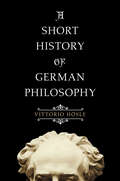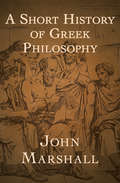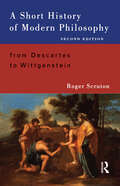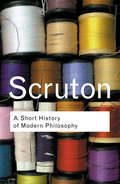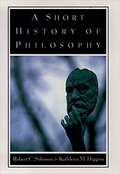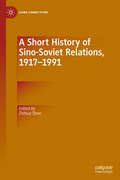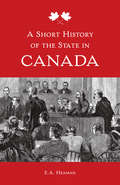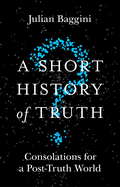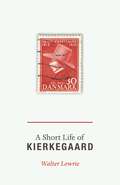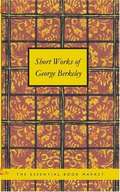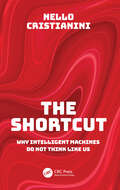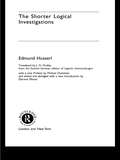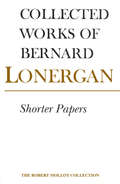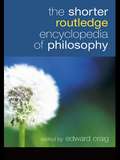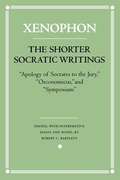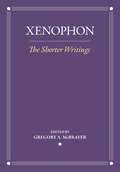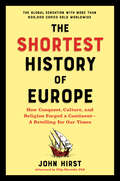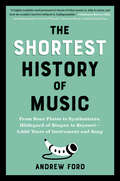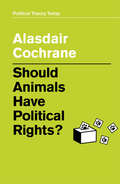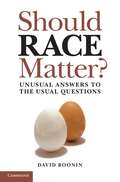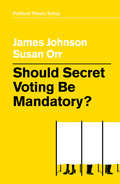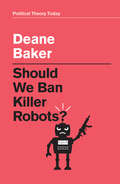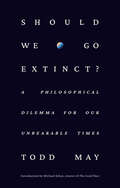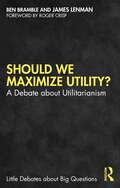- Table View
- List View
A Short History of German Philosophy
by Vittorio Hösle Steven RendallThis concise but comprehensive book provides an original history of German-language philosophy from the Middle Ages to today. In an accessible narrative that explains complex ideas in clear language, Vittorio Hösle traces the evolution of German philosophy and describes its central influence on other aspects of German culture, including literature, politics, and science. Starting with the medieval mystic Meister Eckhart, the book addresses the philosophical changes brought about by Luther's Reformation, and then presents a detailed account of the classical age of German philosophy, including the work of Leibniz and Kant; the rise of a new form of humanities in Lessing, Hamann, Herder, and Schiller; the early Romantics; and the Idealists Fichte, Schelling, and Hegel. The following chapters investigate the collapse of the German synthesis in Schopenhauer, Feuerbach, Marx, and Nietzsche. Turning to the twentieth century, the book explores the rise of analytical philosophy in Frege and the Vienna and Berlin circles; the foundation of the historical sciences in Neo-Kantianism and Dilthey; Husserl's phenomenology and its radical alteration by Heidegger; the Nazi philosophers Gehlen and Schmitt; and the main West German philosophers, including Gadamer, Jonas, and those of the two Frankfurt schools. Arguing that there was a distinctive German philosophical tradition from the mid-eighteenth century to the mid-twentieth century, the book closes by examining why that tradition largely ended in the decades after World War II.A philosophical history remarkable for its scope, brevity, and lucidity, this is an invaluable book for students of philosophy and anyone interested in German intellectual and cultural history.
A Short History of Greek Philosophy
by John MarshallAn overview of the works that form the foundation of Western philosophy The writings of Socrates, Plato, and Aristotle have resonated through the millennia and continue to influence the lives of people today. In A Short History of Greek Philosophy, renowned British classicist John Marshall provides a thorough yet engaging account of the seminal philosophical movements of ancient Greece, from the Sophists to the Sceptics to the Stoics. For readers looking to dip their toes into the vast ocean of Western philosophy, Marshall&’s history provides the perfect springboard. This ebook has been professionally proofread to ensure accuracy and readability on all devices.
A Short History of Modern Philosophy: From Descartes to Wittgenstein (Routledge Classics Ser.)
by Roger ScrutonA Short History of Modern Philosophy is a lucid, challenging and up-to-date survey of the philosophers and philosophies from the founding father of modern philosophy, René Descartes, to the most important and famous philosopher of the twentieth century, Ludwig Wittgenstein. Roger Scruton has been widely praised for his success in making the history of modern philosophy cogent and intelligible to anyone wishing to understand this fascinating subject. In this new edition, he has responded to the explosion of interest in the history of philosophy by substantially rewriting the book, taking account of recent debates and scholarship.
A Short History of Modern Philosophy: From Descartes to Wittgenstein (Routledge Classics)
by Roger ScrutonDiscover for yourself the pleasures of philosophy! Written both for the seasoned student of philosophy as well as the general reader, the renowned writer Roger Scruton provides a survey of modern philosophy. Always engaging, Scruton takes us on a fascinating tour of the subject, from founding father Descartes to the most important and famous philosopher of the twentieth century, Ludwig Wittgenstein. He identifies all the principal figures as well as outlines of the main intellectual preoccupations that have informed western philosophy. Painting a portrait of modern philosophy that is vivid and animated, Scruton introduces us to some of the greatest philosophical problems invented in this period and pursued ever since. Including material on recent debates, A Short History of Modern Philosophy is already established as the classic introduction. Read it and find out why.
A Short History Of Philosophy
by Robert C. Solomon Kathleen M. HigginsPhilosophy is a singularly expansive enterprise, a fascinating outgrowth of a human nature that demands we question who and why we are. In A Short History of Philosophy , the most accessible concise portrait of philosophy in seventy years, Robert Solomon and Kathleen Higgins meet the challenge of accurately and engagingly describing it all, revelling in philosophy as "the art of wonder," the search for meaning, a gripping, dramatic endeavor. Here is the entire history of philosophy--ancient, medieval, and modern, from cultures both East and West--described in its historical and cultural context. "The concepts that lie at the heart of philosophy antedate history by thousands of years," the authors write in their introduction, noting that the ancient concept of immortality, prehistorical ideas about magic, and the complex set of beliefs implied by the practice of human sacrifice all exhibit philosophic underpinnings. Solomon and Higgins chart the profound development of philosophical thought around the world and through the centuries from the first stirrings of speculation and wonder to the rise of distinct (and often antithetical) philosophical traditions, moral constructs, and religious practices. From the early Greek and Asian philosophers and the mythological traditions that preceded them, to the great Greek, Indic, and Chinese philosophers, to the drama of the great religious philosophies, the authors have spun a marvelous tale that leads to the development and decline of modernity. Along with the major characters, such as Aristotle, Kant, and Confucius, Solomon and Higgins draw engaging portraits of less well-known alchemists, mystics, rebels, eccentrics of all sorts, including figures often ignored in philosophy--figures such as Teresa of Avila, who contributed to the mystical traditions of Catholicism; al-Razi, a contrarian Persian philosopher within the Arabic tradition who described the philosophical life as "godlike;" and Erasmus, the Dutch philosopher who parodied the foolishness of man in his praise of folly. With a clear, witty style and a flair for making complex ideas accessible, the authors also convincingly demonstrate the relevance of philosophy to our times, emphasizing the legacy of the revolutions wrought by science, industry, colonialism, and sectarian warfare, and the philosophical responses to the traumas of the twentieth century (including two world wars and the Holocaust): existentialism, positivism, postmodernism, feminism, and multiculturalism among them. But Solomon and Higgins go beyond merely retelling the rich history of philosophy; the authors provide their own twists and interpretations of events, resulting in a story that reveals the continuing complexity and diversity of a richly textured and nuanced intellectual tradition. All who are "lovers of wisdom" will find much to reward them in this book.
A Short History of Sino-Soviet Relations, 1917–1991 (China Connections)
by Zhihua ShenDrawing on the rich trove of recently declassified Russian and Chinese archival materials, this history of Sino-Soviet relations in the 20th century sheds new light on key events during this period. It offers fresh insights into the role of ideology and national interests in the evolution of the complex and turbulent relationship between not just the two countries but also their respective Communist Parties. The chapters on the normalization of bilateral ties provide an in-depth analysis of divisions in the socialist camp that culminated in both its collapse and the disintegration of the Soviet Union. The book argues that 20th century Sino-Soviet relations reflected both long-standing and emerging political and geopolitical challenges facing members of the Cold War socialist camp, in particular tensions between the ideal of internationalism and national aspirations, between commitment to the principle of sovereignty and commitment to that of equality in international relations, and between inter-party relations and inter-state relations. This makes for a valuable addition to the reading lists of all those interested in the development of the relationship between two of the world’s most important countries.
A Short History of the State in Canada
by E. A. HeamanA concise, elegant survey of a complex aspect of Canadian history, A Short History of the State in Canada examines the theory and reality of governance within Canada's distinctive political heritage: a combination of Indigenous, French, and British traditions, American statism and anti-statism, and diverse, practical experiments and experiences.E.A. Heaman takes the reader through the development of the state in both principle and practice, examining Indigenous forms of government before European contact; the interplay of French and British colonial institutions before and after the Conquest of New France; the creation of the nineteenth-century liberal state; and, finally, the rise and reconstitution of the modern social welfare state. Moving beyond the history of institutions to include the development of political cultures and social politics, A Short History of the State in Canada is a valuable introduction to the topic for political scientists, historians, and anyone interested in Canada's past and present.
A Short History of Truth: Consolations for a Post-Truth World
by Julian BagginiHow did we find ourselves in a "post-truth" world of "alternative facts"? And can we get out of it? A Short History of Truth sets out to answer these questions by looking at the complex history of truth and falsehood. It identifies ten types of supposed truth and explains how easily each can become the midwife of falsehood. There is no species of truth that we can rely on unquestioningly, but that does not mean the truth can never be established. Attaining truth is an achievement we need to work for, and each chapter will end up with a truth we can have some confidence in.This history builds into a comprehensive and clear explanation of why truth is now so disputed by exploring 10 kinds of truth:1. Eternal truths.2. Authoritative truths.3. Esoteric truths.4. Reasoned truths.5. Evidence-based truths.6. Creative truths.7. Relative truths. 8. Powerful truths9. Moral truths.10. Holistic truths. Baggini provides us with all we need to restore faith in the value and possibility of truth as a social enterprise. Truth-seekers need to be sceptical not cynical, autonomous not atomistic, provisional not dogmatic, open not empty, demanding not unreasonable.
A Short History of Truth: Consolations For A Post-truth World
by Julian BagginiHow did we find ourselves in a "post-truth" world of "alternative facts"? And can we get out of it? A Short History of Truth sets out to answer these questions by looking at the complex history of truth and falsehood. It identifies ten types of supposed truth and explains how easily each can become the midwife of falsehood. There is no species of truth that we can rely on unquestioningly, but that does not mean the truth can never be established. Attaining truth is an achievement we need to work for, and each chapter will end up with a truth we can have some confidence in.This history builds into a comprehensive and clear explanation of why truth is now so disputed by exploring 10 kinds of truth:1. Eternal truths.2. Authoritative truths.3. Esoteric truths.4. Reasoned truths.5. Evidence-based truths.6. Creative truths.7. Relative truths. 8. Powerful truths9. Moral truths.10. Holistic truths. Baggini provides us with all we need to restore faith in the value and possibility of truth as a social enterprise. Truth-seekers need to be sceptical not cynical, autonomous not atomistic, provisional not dogmatic, open not empty, demanding not unreasonable.
A Short Life of Kierkegaard
by Walter LowrieA small, insignificant-looking intellectual with absurdly long legs, Søren Kierkegaard (1813-1855) was a veritable Hans Christian Andersen caricature of a man. A strange combination of witty cosmopolite and melancholy introvert, he spent years writing under a series of fantastical pseudonyms, lavishing all the splendor of his magnificent mind on a seldom-appreciative world. He had a tragic love affair with a young girl, was dominated by an unforgettable Old Testament father, fought a sensational literary duel with a popular satiric magazine, and died in the midst of a violent quarrel with the state church for which he had once studied theology. Yet this iconoclast produced a number of brilliant books that have profoundly influenced modern thought. In this classic biography, the celebrated Kierkegaard translator Walter Lowrie presents a charming and warmly appreciative introduction to the life and work of the great Danish writer. Lowrie tells the story of Kierkegaard's emotionally turbulent life with a keen sense of drama and an acute understanding of how his life shaped his thought. The result is a wonderfully informative and entertaining portrait of one of the most important thinkers of the past two centuries. This edition also includes Lowrie's wry essay "How Kierkegaard Got into English," which tells the improbable story of how Lowrie became one of Kierkegaard's principal English translators despite not learning Danish until he was in his 60s, as well as a new introduction by Kierkegaard scholar Alastair Hannay.
Short Works of George Berkeley
by George BerkeleyGeorge Berkeley (1685-1753) was one of the three great British empiricist philosophers; his best known works include An Essay towards a New Theory of Vision and A Treatise Concerning the Principles of Human Knowledge.This text includes: Querist; A Essay Towards a New Theory of Vision; A Treatise Concerning the Principles of Human
The Shortcut: Why Intelligent Machines Do Not Think Like Us
by Nello CristianiniAn influential scientist in the field of artificial intelligence (AI) explains its fundamental concepts and how it is changing culture and society.A particular form of AI is now embedded in our tech, our infrastructure, and our lives. How did it get there? Where and why should we be concerned? And what should we do now? The Shortcut: Why Intelligent Machines Do Not Think Like Us provides an accessible yet probing exposure of AI in its prevalent form today, proposing a new narrative to connect and make sense of events that have happened in the recent tumultuous past, and enabling us to think soberly about the road ahead.This book is divided into ten carefully crafted and easily digestible chapters. Each chapter grapples with an important question for AI. Ranging from the scientific concepts that underpin the technology to wider implications for society, it develops a unified description using tools from different disciplines and avoiding unnecessary abstractions or words that end with -ism. The book uses real examples wherever possible, introducing the reader to the people who have created some of these technologies and to ideas shaping modern society that originate from the technical side of AI. It contains important practical advice about how we should approach AI in the future without promoting exaggerated hypes or fears.Entertaining and disturbing but always thoughtful, The Shortcut confronts the hidden logic of AI while preserving a space for human dignity. It is essential reading for anyone with an interest in AI, the history of technology, and the history of ideas. General readers will come away much more informed about how AI really works today and what we should do next.
The Shorter Logical Investigations (International Library of Philosophy)
by Edmund HusserlFirst Published in 2004. Routledge is an imprint of Taylor & Francis, an informa company.
Shorter Papers: Volume 20
by Robert M. Doran SJ Robert C. Croken H. Daniel Monsour Bernard LonerganAs a prolific scholar and theologian, Bernard Lonergan authored a significant amount of material aside from the works with which he is commonly associated. Shorter Papers is a collection of lesser-known items written by Lonergan over the course of his career. Together, they offer privileged access to the author's thought and work, as well as a glimpse at some of his most personal qualities. <P><P> The items in this volume extend from some of the earliest writings – the Blandyke Papers, for instance, which predates any of the materials represented in the Collected Works – to pieces written near the end of Lonergan's life. Organized chronologically, they give an impression of his development as a writer, his ever-strengthening religious commitment, and his role as teacher. As a sampling of pieces from the late 1920s to the early 1980s, Shorter Papers testifies to the cumulative impact of Lonergan's work, as well as to the amazing continuity that he maintained throughout his career as an author and intellectual.
The Shorter Routledge Encyclopedia of Philosophy
by Edward CraigThe Shorter REP presents the very best of the acclaimed ten volume Routledge Encyclopedia of Philosophy in a single volume. It makes a selection of the most important entries available for the first time and covers all you need to know about philosophy, from Aristotle to Wittgenstein and animals and ethics to scientific method.Comprising over 900 entries and covering the major philosophers and philosophical topics, The Shorter REP includes the following special features: Unrivalled coverage of major philosophers, themes, movements and periods making the volume indispensable for any student or general reader Fully cross-referenced Revised versions of many of the most important entries, including fresh suggestions for further reading Over twenty brand new entries on important new topics such as Cloning and Sustainability entries by many leading philosophers such as Bernard Williams, Martha Nussbaum, Richard Rorty, Onora O'Neill, T.M. Scanlon and Anthony Appiah Striking new text design to help locate key entries quickly and easily An outstanding guide to all things philosophical, The Shorter Routledge Encyclopedia of Philosophy provides an unrivalled introduction to the subject for students and general readers alike.
The Shorter Socratic Writings: Apology of Socrates to the Jury, Oeconomicus, and Symposium'
by Xenophon Robert C. BartlettThis book presents translations of three dialogues Xenophon devoted to the life and thought of his teacher, Socrates. Each is accompanied by notes and an interpretative essay that will introduce new readers to Xenophon and foster further reflection in those familiar with his writing.
The Shorter Writings: "apology Of Socrates To The Jury," "oeconomicus," And "symposium" (Agora Editions)
by XenophonThis book contains new, annotated, and literal yet accessible translations of Xenophon’s eight shorter writings, accompanied by interpretive essays that reveal these works to be masterful achievements by a serious thinker of the first rank who raises important moral, political, and philosophical questions. Five of these shorter writings are unmistakably devoted to political matters. The Agesilaos is a eulogy of a Spartan king, and the Hiero, or the Skilled Tyrant recounts a searching dialogue between a poet and a tyrant. The Regime of the Lacedaemonians presents itself as a laudatory examination of what turns out to be an oligarchic regime of a certain type, while The Regime of the Athenians offers an unflattering picture of a democratic regime. Ways and Means, or On Revenues offers suggestions on how to improve the political economy of Athens’ troubled democracy.The other three works included here—The Skilled Cavalry Commander, On Horsemanship, and The One Skilled at Hunting with Dogs—treat skills deemed appropriate for soldiers and leaders, touching on matters of political importance, especially in regard to war. By bringing together Xenophon’s shorter writings, this volume aims to help those interested in Xenophon to better understand the core of his thought, political as well as philosophical.Interpretive essays by: Wayne Ambler, Robert C. Bartlett, Amy L. Bonnette, Susan D. Collins, Michael Ehrmantraut, David Levy, Gregory A. McBrayer, Abram N. Shulsky.
The Shortest History of Europe: How Conquest, Culture, And Religion Forged A Continent--a Retelling For Our Times (Shortest History #0)
by James HirstUncover the decisive moments that shaped a world-changing continent. The Shortest History books deliver thousands of years of history in one riveting, fast-paced read. Celebrated historian John Hirst draws from his own lectures to deliver this ultra-accessible master class on the making of modern Europe, from Ancient Greece through World War II. With over 600,000 copies sold worldwide, this brief history is a global sensation propelled by a thesis of astonishing simplicity: Just three elements—German warfare, Greek and Roman culture, and Christianity—come together to explain everything else, from the Crusades to the Industrial Revolution. Hirst’s razor-sharp grasp of cause and effect helps us see with sparkling clarity how the history of Europe—the crucible of liberal democracy—shapes the way we live today.
The Shortest History of Music: From Bone Flutes to Synthesizers, Hildegard of Bingen to Beyoncé - 5,000 Years of Instrument and Song (The Shortest History Series)
by Andrew FordFrom prehistoric songwriting to digital recording, discover the history of the world’s favorite art form No other art is as popular—or pervasive—as music. With just a few clicks, anyone can cue up (and critique) Chopin or Cher, The Bangles or The Beatles—even the brand-new Beyoncé. But things weren’t always this way. In this brisk, breakneck history under 300 pages, award-winning composer, author, and broadcaster Andrew Ford replays the dramatic evolution of music, from early oral songs to the first orchestras (and their wealthy patrons) and from the emergence of recording technology to the multibillion-dollar industry we know today. The Shortest History of Music explores the immense influence of religion, politics, and the economy on world music, what led humans to make music in the first place, and why—in every era—we are irresistibly drawn to listen to it. The Shortest History books deliver thousands of years of history in one riveting, fast-paced read.
Should Animals Have Political Rights? (Political Theory Today)
by Alasdair CochraneAll political communities must make decisions about how to regulate the treatment of animals. Most states currently protect animals through outlawing the infliction of ‘unnecessary suffering’. But do animals’ rights end there? In this book, Alasdair Cochrane argues that states must go much further. Animals have rights to be protected not only from the cruelty of individuals, but also from those structures and institutions which routinely (and, in some cases, necessarily) cause them harm, such as industrialised animal agriculture. But even that isn’t adequate. In order to ensure that their interests are taken seriously, it is imperative that we represent their interests throughout the political process – they require not only rights to protection, but also to democratic membership. Cochrane’s important intervention in this controversial debate will be essential reading for anyone interested in the intersection of political theory and animal rights.
Should Race Matter? Unusual Answers to the Usual Questions
by David BooninPhilosopher David Boonin attempts to answer the moral questions raised by five important and widely contested racial practices: slave reparations, affirmative action, hate speech restrictions, hate crime laws and racial profiling. Arguing from premises that virtually everyone on both sides of the debates over these issues already accepts, Boonin arrives at an unusual and unorthodox set of conclusions, one that is neither liberal nor conservative, color conscious nor color blind. Defended with the rigor that has characterized his previous work but written in a more widely accessible style, this provocative and important new book is sure to spark controversy and should be of interest to philosophers, legal theorists and anyone interested in trying to resolve the debate over these important and divisive issues.
Should Secret Voting Be Mandatory? (Political Theory Today)
by James JohnsonThe secrecy of the ballot, a crucial basic element of representative democracy, is under threat. Attempts to make voting more convenient in the face of declining turnout – and the rise of the “ballot selfie” – are making it harder to guarantee secrecy. Leading scholars James Johnson and Susan Orr go back to basics to analyze the fundamental issues surrounding the secret ballot, showing how secrecy works to protect voters from coercion and bribery. They argue, however, that this protection was always incomplete: faced with effective ballot secrecy, powerful actors turned to manipulating turnout – buying presence or absence at the polls – to obtain their electoral goals. The authors proceed to show how making both voting and voting in secret mandatory would foreclose both undue influence and turnout manipulation. This would enhance freedom for voters by liberating them from coercion or bribery in their choice of both whether and how to vote. This thought-provoking and insightful text will be invaluable for students and scholars of democratic theory, elections and voting, and political behavior.
Should We Ban Killer Robots? (Political Theory Today)
by Deane BakerImages of killer robots are the stuff of science fiction – but also, increasingly, of scientific fact on the battlefield. Should we be worried, or is this a normal development in the technology of war? In this accessible volume ethicist Deane Baker cuts through the confusion over whether lethal autonomous weapons – so-called killer robots – should be banned. Setting aside unhelpful analogies taken from science fiction, Baker looks instead to our understanding of mercenaries (the metaphorical ‘dogs of war’) and weaponized animals (the literal dogs of war) to better understand the ethical challenges raised by the employment of lethal autonomous weapons (the robot dogs of war). These ethical challenges include questions of trust and reliability, control and accountability, motivation and dignity. Baker argues that, while each of these challenges is significant, they do not – even when considered together – justify a ban on this emerging class of weapon systems. This book offers a clear point of entry into the debate over lethal autonomous weapons – for students, researchers, policy makers and interested general readers.
Should We Go Extinct?: A Philosophical Dilemma for Our Unbearable Times
by Todd MayShould we bring new humans into the world? Or would it be better off without us? A renowned philosopher and advisor to NBC&’s The Good Place offers a thoughtful exploration of humanity&’s future—or lack thereof. &“For more than five years, Todd May was my philosophical advisor. I heartily recommend that he be yours as well. (It helps that he&’s quite funny.)&”—Michael Schur, from the Introduction These days it&’s harder than ever to watch TV, scroll social media, or even just sit at home looking out of the window without contemplating the question at the heart of philosopher Todd May&’s Should We Go Extinct? Facing climate destruction and the revived specter of nuclear annihilation even as humans continue to cause untold suffering to our fellow creatures on planet Earth, we are forced each day to contemplate whether the world would be better off in our absence. In this timely, fascinating examination, May, a renowned philosopher and advisor to the acclaimed TV show The Good Place, reasons both for and against the continuation of our species, trying to help us understand how and whether, the positive and negative tallies of the human ledger are comparable, and what conclusions we might draw about ourselves and our future from doing so. He discusses the value that only humans can bring to the world and to one another as well as the goods, like art and music, that would be lost were we no longer here. On the other side of the ledger, he walks us through the suffering we cause to nature and the non-human world, seeking to understand whether it&’s possible to justify such suffering against our merits and if not, what changes we could make to reduce the harm we cause. In this moment of rising pessimism about the future, and as many people wonder whether they should bring children into such a dark and difficult world, the questions May tackles in Should We Go Extinct? are hardly theoretical. As he explores the complexities involved with changes such as an end to factory farming, curbing scientific testing of animals, reducing the human population, and seeking to develop empathy with our fellow creatures, May sketches a powerful framework for establishing our responsibilities as a species and gives hope that we might one day find universal agreement that the answer to his title question should be No.
Should We Maximize Utility?: A Debate about Utilitarianism (Little Debates about Big Questions)
by null Ben Bramble null James LenmanUtilitarianism directs us to act in ways that impartially maximize welfare or utility or at least aim to do that. Some find this view highly compelling. Others object that it has intuitively repugnant results, that it condones evildoing and injustice, that it is excessively imposing and controlling, that it is alienating, and that it fails to offer meaningful, practical guidance.In this ‘Little Debates’ volume, James Lenman argues that utilitarianism’s directive to improve the whole universe on a cosmic time scale is apt to lead it down a path of imperious moral overreach. The project, he further maintains, ultimately shipwrecks on an extreme lack of epistemic humility in framing the determinants of what is morally right and wrong beyond the limits of what we can ever hope to know. Utilitarianism thus leaves us morally clueless. In contrast, Ben Bramble seeks to develop and defend an original form of utilitarianism, less vulnerable than other, more familiar versions to a number of important objections, including those raised by Lenman. He aims to avoid such unappealing results by presenting it as a claim about what we have the most reason to do, and not as a theory of right action, which Bramble urges we should understand quite differently by reference to what would motivate virtuous people.Key Features: Focuses on one of the dominant ethical theories debated by moral philosophers today Clearly written, free of jargon and technicality, and highly accessible to students Addresses questions of great importance to anyone wishing to grow in understanding of human moral life Provides a glossary of key terms highlighted in bold as well as a bibliography for further reading Important issues discussed include: welfare; value; right action; virtue; impartiality; obligations to non-human animals; the badness of human extinction; the happiness of future people; the ethics of climate change; the long term future; and the moral significance of the limits to what we can know.
